Free land? How about a free house? Kansas town tries a little of everything to grow
If you’re looking for evidence of rural decay and postindustrial decline in this dusty north-central Kansas town, you can find it.
The last remaining manufacturing employer, US Tower, closed its facility during the pandemic, putting about 25 local workers out of a job. On the edge of town lies a subdivision without any houses, a barren reminder of a free land program that has failed to attract much interest. In the middle of the day, the shutting of a car door echoes for blocks, bouncing between the aging two-story buildings that bracket Lincoln Avenue downtown. Many are vacant.
Tilt your settings, though, and brighter colors seep into the picture. This town of 1,200 still has a locally owned grocery store, a pharmacy, a movie theater, an arts center, two banks, a hospital and a nursing home. A restaurant in the motel on the edge of town serves Himalayan food. A fitness center is going in downtown. A historic home — free to anyone willing to move it — went viral earlier this year, generating a spike of national interest in Lincoln.
And houses are selling fast, for much more than they used to.
“I bought mine in foreclosure, the first day it was on the market, sight unseen,” said new resident Deb Niedermeyer, sliding the Monday night $14.99 dinner special — Salisbury steak with brown gravy, hand-cut fries, greens beans and a biscuit — across the bar at Frankie’s, the only restaurant with evening service in downtown Lincoln. “And I only found out about it because a banker here knew I was looking and told us it was coming available.”
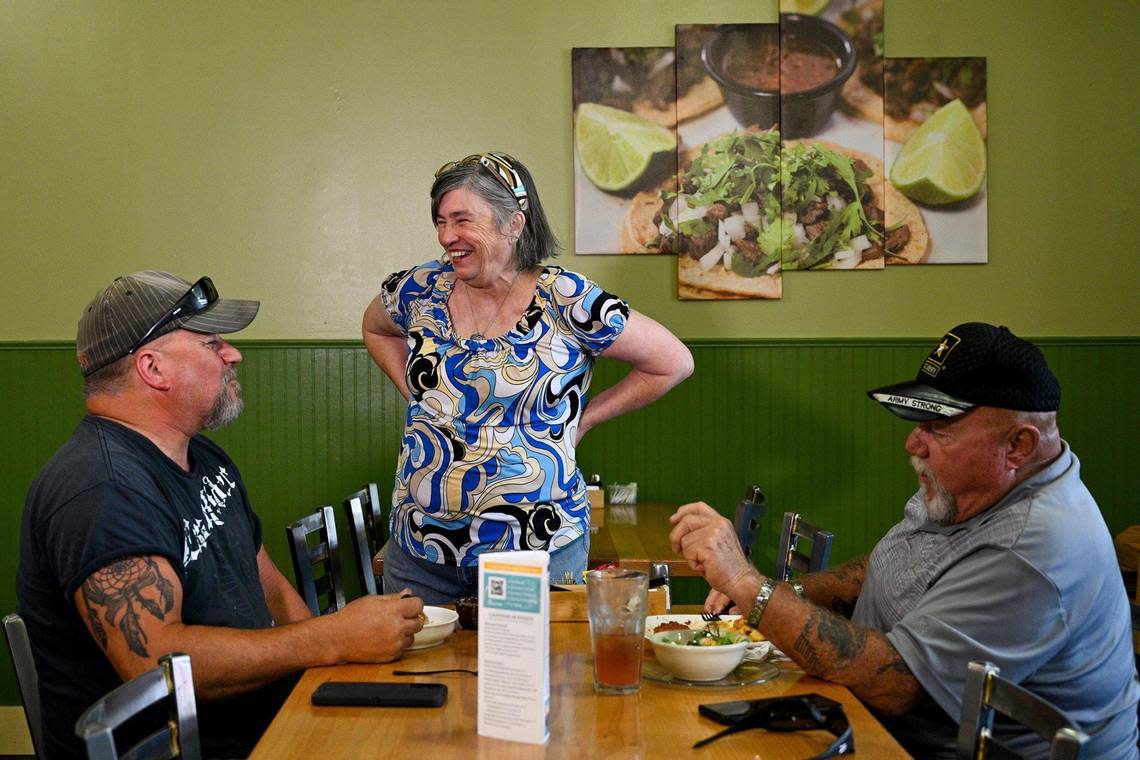
“We’re beginning to see more people looking at us from outside the state,” confirmed Kelly Gourley, Lincoln’s economic development director. “Some of the people that have moved here in the last year had no connection to Lincoln whatsoever before they came. That was definitely not always the case. It’s been a good thing for us.”
Whatever momentum Lincoln has at the moment can be partly attributed to macroeconomic trends. As residents find themselves priced out of the housing market in West Coast and mountain states, they’re increasingly expanding their horizons to places where a small-town existence remains affordable and the volume of modern American life is turned way down.
But it is also the result of superstar citizens like Gourley, who was raised in Scandia (about 80 miles north of Lincoln), graduated from Kansas State University’s college of architecture, and boomeranged back to Kansas after 11 years working in historic preservation in Michigan. Gourley started in her position in 2014 and has tried a little bit of everything to reverse the ghost-town trajectory common to so many rural Kansas communities.
That has meant taking a more expansive view of the job description, whether by working directly with individual homeowners, creating a startup program for child care grants, or using social media in ways that are second-nature in the cities but sometimes foreign out here on the disconnected Plains.
She also has skin in the game. The aforementioned fitness center? It’s hers. After years of committees and community meetings about the need for one, she purchased a former general store downtown, built in 1917, and has spent the past year building it out.
“I’m kind of serving as my own guinea pig,” Gourley said. “I’m applying for all these grants, going through mountains of paperwork, value engineering this thing, bidding it out. And hopefully at the end of it I’ll be able to say it is economically possible to buy an old building and execute a successful project in a place like Lincoln.”
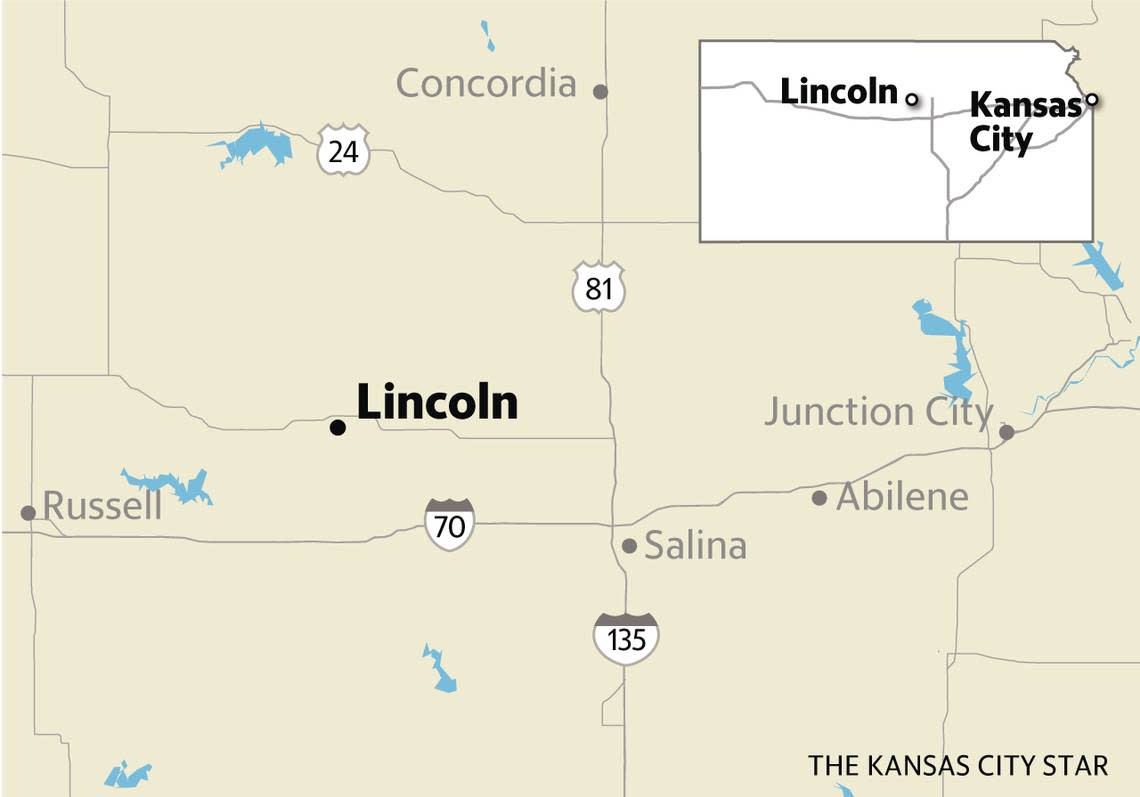
Free land, costly homes
The idea stretches back to the Homestead Act of 1862: Spur economic growth in rural America by giving away free land to those who will make good use of it.
In those pioneer days, the deal gave 160 acres of federal land to settlers who agreed to move west and farm on it. A century and a half later, several Kansas towns trotted out a scaled-down version of the Homestead Act.
Lincoln was one of them.
In 2004, Lincoln’s leaders took out a bond, paved a couple of cul-de-sacs on the east side of town, installed utilities for 21 lots, and bought some billboards on Interstate 70 that shouted “FREE LAND.” They hoped that giving away a half-acre plot might be enough to entice people to move to Lincoln, fill their open jobs and re-energize the shrinking tax base.
Eighteen years later, one of the cul-de-sacs is entirely empty. On the other sit two houses. One belongs to the widow of the mayor who pushed for the free land program. The other is a spec house that was never purchased, ended up in foreclosure, and was eventually sold by the bank to a Wichita couple. It is currently a rental.
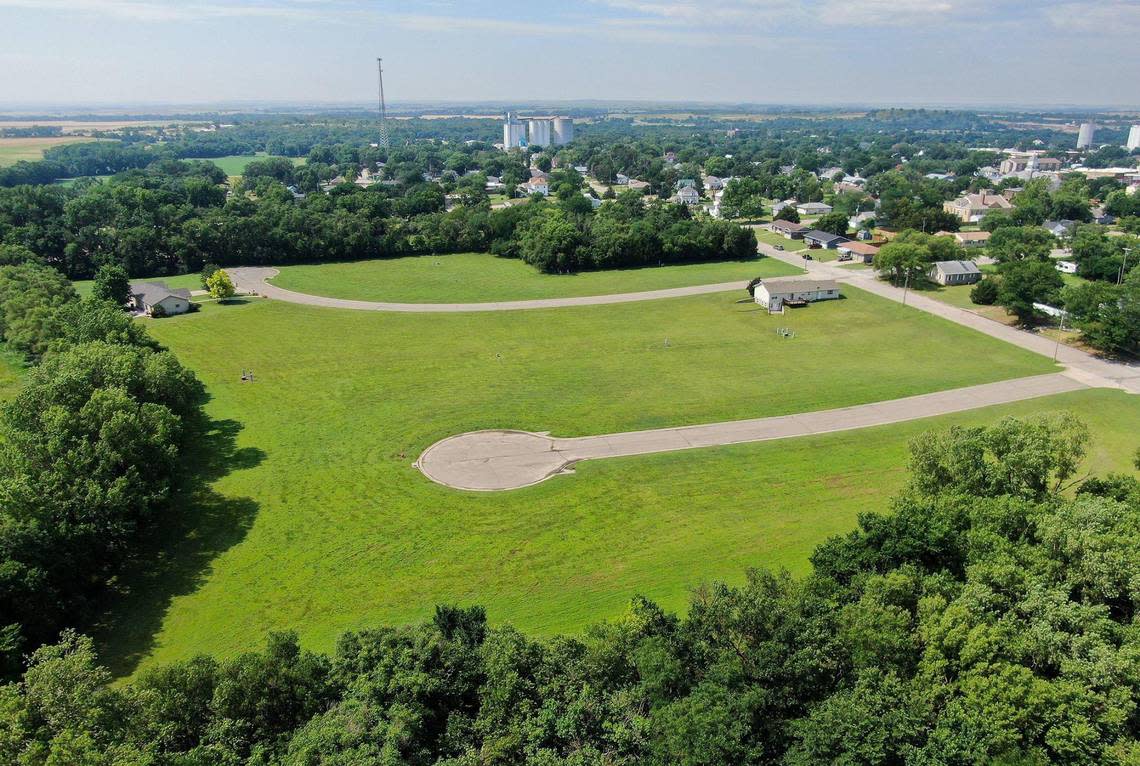
“It was a really big, progressive idea at the time, and I applaud them for having a vision,” Gourley said of city leaders who enacted the plan in 2004. “But it was a swing and a miss in terms of the community.”
The program is still active, and Gourley regularly fields calls about it. Most of the time, she winds up having to explain the requirements. You have to build a house on the lot. It has to be at least 1,300 square feet. It can’t be a mobile home. No, grant money is not available from the city.
“People think it’s a freebie,” Gourley said. “Many are looking to squat on the land, or park their RV on it. Or they think it’s a ranch — they ask if they can have horses and cows. No, you’re in the city. If you want a free ranch, good luck. I don’t think they’re giving those away.”
The types of calls have changed since the pandemic, Gourley said.
“Before, it was people who realistically had no ability to build a house, whether financially or in terms of their skills,” she said. “Lately, the people calling are more likely to be financially capable and are looking to get out of whatever city they’re living in. But building a house is a tough thing to do here.”
The economics of new-home construction in rural Kansas are a nightmare. In Kansas City or even Salina, 40 miles southeast of Lincoln, a builder who spends $150,000 to construct a new home can safely assume it will sell for far more than $150,000, ensuring a profit. Not so in Lincoln, where three-bedroom homes lately sell for between $100,000 and $130,000, according to Gourley.
Financing a build is also a barrier. Banks aren’t inclined to make loans to money-losing projects.
Meanwhile, a big chunk of the existing housing stock in Lincoln is old and dilapidated — in some cases, unlivable.
“We are absolutely desperate for houses,” Gourley said.
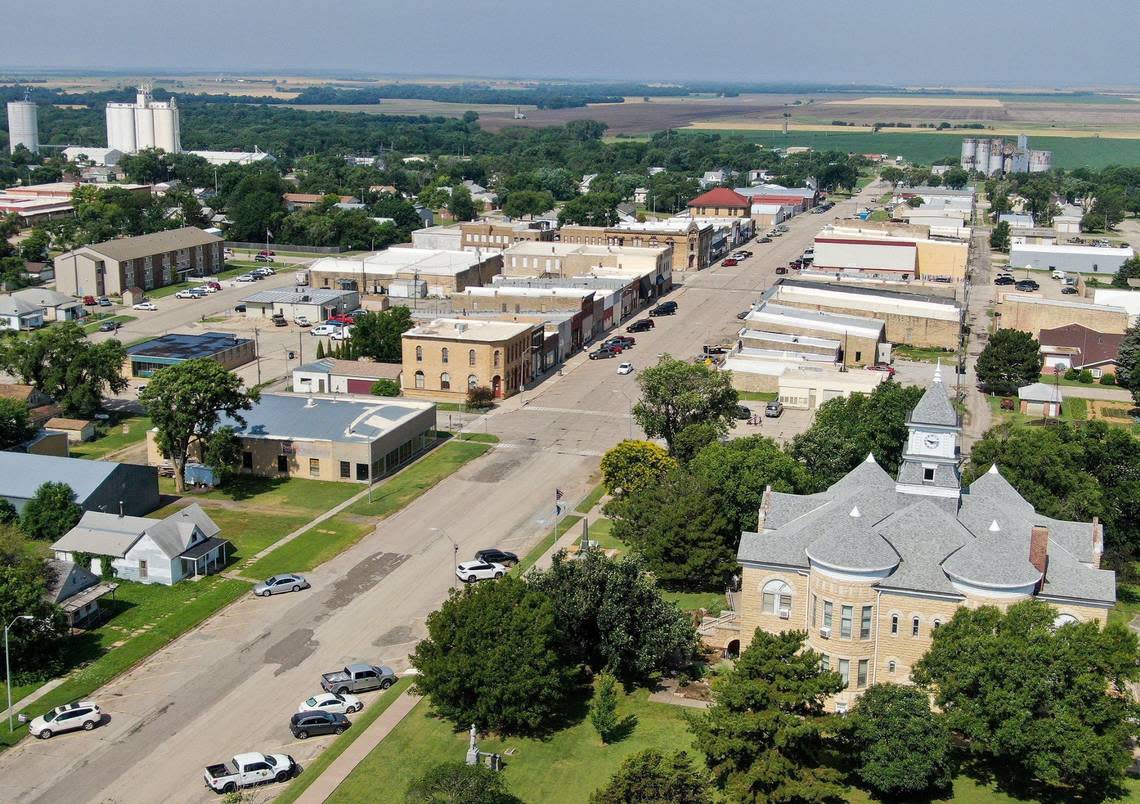
Because of this deep need, Gourley has a borderline encyclopedic knowledge of the status of various homes in Lincoln. She can drive down a block and say who lives where, which decaying houses are likely to be demolished, which might be savable, and which ones might be eligible for state or federal grants.
She believes the most realistic way to add housing in Lincoln is to get chronically vacant houses houses back into inventory. And the way to do that is to apply for grants — demolition grants, moderate income housing grants, rental rehabilitation grants — so someone could afford to make the repairs needed to get some of Lincoln’s abandoned homes livable again.
“We target homes that have been vacant for at least five years and that have three bedrooms and two bathrooms, since houses for families is our greatest housing need,” Gourley said.
Gourley is not above knocking on the door of a crumbling house and asking the owner if he might be interested in selling. “Even then, though, you have to find someone willing to go through the headache of rehabbing it,” she said.
Despite all these challenges, the housing market in Lincoln is looking up lately. In 2017, Lincoln clocked 14 residential sales. That number jumped to 39 the next year and has held steady around there in the years since.
Five new houses were built in 2020 and six in 2021, compared to just one in 2018.
Gourley credits a pandemic effect but also points to a simple innovation her office made in 2019: a countywide open house.
“We coordinated the open houses so that people could drive to town and see several homes on the same day,” Gourley said. “We did a big push on Facebook, did paid advertising. And before the day even got here, one of the houses sold. I felt like something clicked there. Lately by the time we get a good house on our website, we find out a day or two later it’s already been sold.”
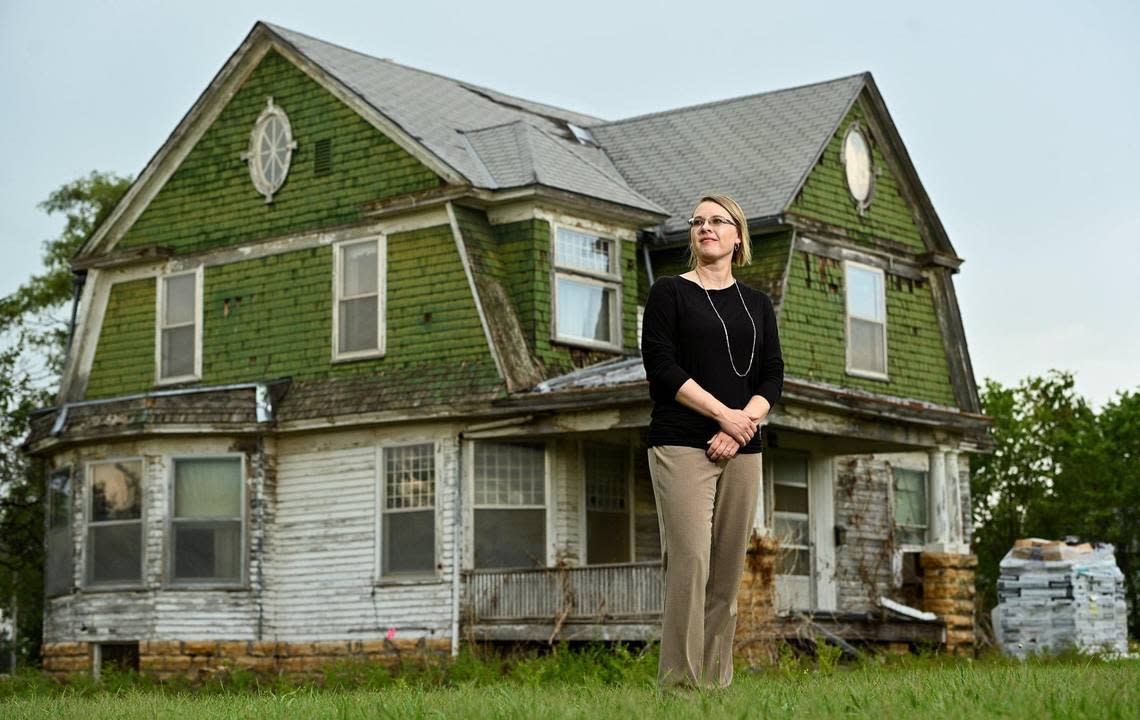
A very ‘Cheap Old House’
The internet has opened up other avenues for growth and progress in Lincoln. Take, for example, the ruckus that ensued earlier this year after a house Gourley had spent years trying to save was featured first on a popular email newsletter and then on an Instagram page with nearly 2 million followers.
The home, a run-down Dutch Colonial built in 1910, sits on the same block as the Lincoln County Hospital, which purchased the property about five years ago with the intention of demolishing it to expand the hospital.
“It looks terrible on the outside,” said Gourley, who’s an ardent historical preservationist, “but inside it’s a great house. I would have expected plaster coming off the walls, but it’s remarkably well-preserved. So I went to the hospital foundation and basically said, ‘Just give me a chance here. Let me find someone who will move this house.’”
But every lead fell through, and by last fall, the hospital had lost patience. Gourley had formed an informal committee to search for people who might be interested, and one of the members offered to pay the hospital $1,000 to give them until the end of 2022. The hospital foundation agreed.
Meantime, Gourley won a Moderate Income Housing Grant from the Kansas Housing Resources Corp., some of which could be used to defray the costs of moving and rehabbing the home.
“At that point, I felt like we had a package we could advertise,” Gourley said. “Basically, we said, whoever is willing to put $150,000 into this beautiful old house — which is about the minimum you’d need to spend to fix the roof, put in a new basement, update the heating and plumbing and electrical — if you commit to that, we’ll put in $30,000 to pay for you to relocate it and fix it up.”
In late January, the tech and business newsletter The Hustle published a story about Lincoln’s free land program, which included mention of the free house by the hospital. Just a few days later, Cheap Old Houses posted the Dutch Colonial on its Instagram page, generating more than a thousand comments.
“It just exploded,” Gourley said. “It was chaotic. Hundreds of phone calls and emails. We were not prepared for that level of interest.”
To whittle down the list of applicants, Gourley and the committee set up an online submission form that required prospects to provide information about their financial situation and where they planned to move the house. Those not weeded out went through another round of screening and questions. Eventually, the committee decided on Eddie and Julie Flores, an Olathe couple with three young children. Julie grew up in Lincoln, and her parents and siblings live there. Eddie is a traveling nurse, so he can be based anywhere.
“We’d always imagined our kids growing up in a place where you have a little more room to breathe,” Julie said. “And we’d been looking for a project house. And when you see the character and the woodwork inside, we just fell in love with it.”
The Floreses won’t be moving the house to the free land subdivision, though that was an option on the table. Instead, later this year, they’ll take it a couple miles east to a three-acre property they recently purchased from Julie’s father. Unruh House Moving, based in Galva, will handle the relocation. Price: $30,000. They’ll also have to pay the local electrical company to either raise or lower the power lines along the route the house takes to its new home. That’ll likely be another $10,000, Julie said.
“We have a 15-year plan,” Julie said. “It starts with fixing up the house, but longer term I’d like start a wedding venue in Lincoln County. We want to invest in making the community better, in bringing more people to Lincoln. What we want to do, I don’t think we could have done in Olathe.”
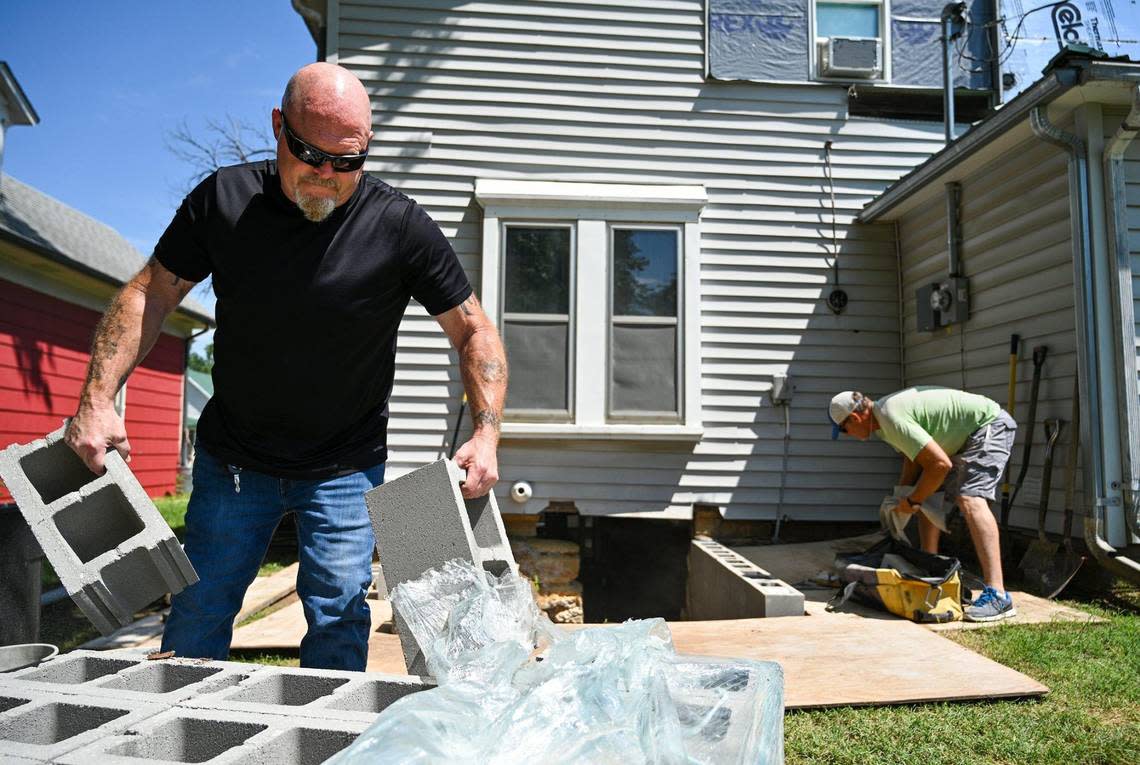
New in town
Scrolling his Instagram feed in north Texas, Jacob Littlejohn saw the Cheap Old Houses post, which led him to a residential listings page on Lincoln County’s website. A longtime Lincoln landlord was selling 10 single-family houses as a package deal. Littlejohn, who has worked in real estate and the online auction business, talked it over with his wife. Then they pulled the trigger.
“We got all 10 of them for $155,000,” Littlejohn, 28, said. “I’d never even stepped foot in Lincoln before February.”
The houses are in rough shape. One was abandoned and is likely a tear-down. The other nine were occupied by tenants but badly in need of paint jobs and in some cases new roofs. He is applying for a variety of grants from Lincoln County to fix up the homes. “Kelly reached out to me right after we bought the houses to tell us about what grants were available,” Littlejohn said.
For the tenants — an oilfield worker, a handyman, a school district employee, and several retired and on Section 8 housing vouchers — rent is going up. The houses were previously leasing for between $250 and $375 per month, Littlejohn said.
“As we improve the properties and the leases expire, we’re trying to bring it up to where nothing in the portfolio is under $350 a month, with the maximum being $600,” Littlejohn said.
Though he views the properties as an investment, Littlejohn said he and his wife, who attended graduate school at K-State, are interested in moving to Lincoln. The problem, he said, is that there’s not much in the way of jobs in the area.
“We’re looking at businesses for sale there, and if we can find something, we’d love to move,” he said. “It’s just a matter of finding the right fit for us. Having Deb there has given us some breathing room with that.”
He meant Deb Niedermeyer, from Frankie’s restaurant. She’s only been in Lincoln for six months and already she manages Littlejohn’s rental properties, works at the restaurant her son Charles Frankenstein and his wife, Priscilla, recently opened, and sits on the board of the Lincoln County Chamber of Commerce. “I’ve found the people here to be so open and inviting,” Niedermeyer said. “If you are sincere and you want to make Lincoln your home, they’re open to you.”
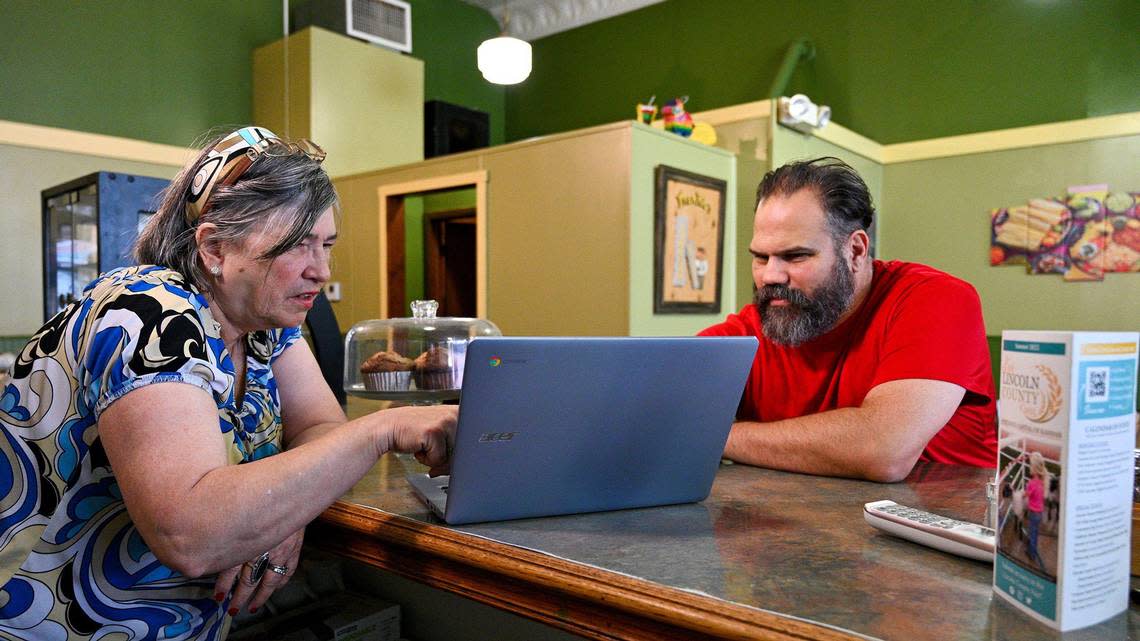
Niedermeyer came to Lincoln to be closer to the Frankensteins, who landed here in January more or less by chance. They owned a restaurant in Whitehall, Montana, and wanted to buy a house there. But home values have soared all across Montana in recent years.
“A house that used to be $60,000 is now $400,000,” Charles, 46, said. “It was just going to be too expensive to live the life we wanted to live — to raise our three kids and send them to a good school system.”
So Charles started looking on LoopNet, the commercial real estate listings site, for cities and towns where they might be able to move and open a restaurant. “Lincoln checked all the boxes,” he said. “You can’t beat the cost of living here.”
Their house cost $70,000, and they were able to do a lease-to-own deal with the economic development office for the restaurant equipment in their downtown space.
They renamed carne asada tacos “brisket tacos” on the menu — “We’ve tried to simplify it so everyone knows what they’re looking at,” Charles said — but otherwise the adjustment has been smooth.
“We had more young people coming in at our place in Montana, and here it’s an older crowd,” he said. “But I’ve noticed even in the last few months an uptick in new people either stopping in to the restaurant or moving into the area.”
Other new arrivals include Jesse Knight, who moved from Arizona to become Lincoln County’s emergency manager and plans to build a distillery on a farm he inherited in Beverly, about 10 miles east. “We’ll resource it all locally, of course,” he said. “The corn and the barley. The idea is to make it a destination. Lincoln having a distillery puts it on the map a little bit, you know?”
Knight has already incorporated the name: Post Rock Distillery. That’s another thing about Lincoln. Cruise around town, and you’ll notice that the courthouse, city hall, the library and several other buildings are made from a unique kind of limestone that looks like a slice of yellow buttercream cake. It is called post rock, and many local businesses — the local motel, Gourley’s fitness center — pay tribute to it in their name.
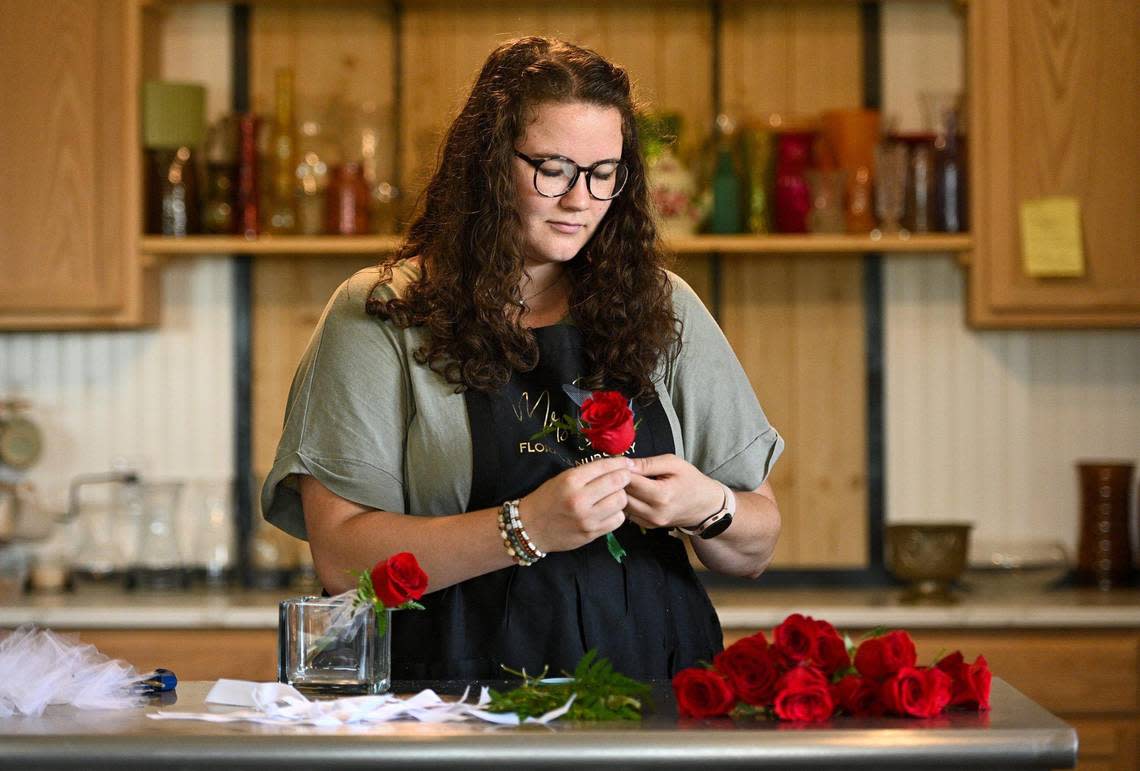
“When people first started moving out here all those years ago, it was all flat and windy, and there weren’t enough trees to cut down to make fence posts,” explained Sara Smith, who arrived in Lincoln from Utah in February, along with her husband Radney and their 9-month-old daughter. “So instead they found this slate rock and cut it into rectangles and used those for fence posts. That’s why they call it post rock. And then they made all these buildings out of it too.”
The Smiths are renting for now: $800/month for a four-bedroom, two-bathroom home right off Lincoln Avenue, the town’s main drag. Radney works remote, so the idea was to give it six months and then decide whether they wanted to stay. They plan to stay. They’re talking about building a home somewhere outside of town.
“We love it,” Smith said, cradling her baby at her hip on the front porch of their 115-year-old home. “We go to the pool, go to the park, go get some cotton candy when they have T-ball games going at the baseball diamond across the street. I’ve got a little part-time job making arrangements at the flower shop, Mrs. B’s.”
She gestured toward the town square, a block away.
“And the post rock, of course,” Smith said, a trace of friendly irony in her voice. “Very exciting.”
